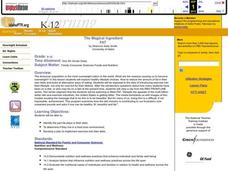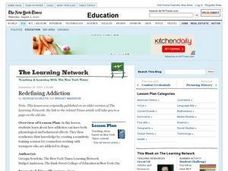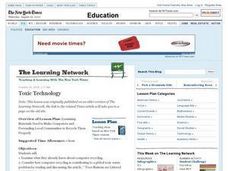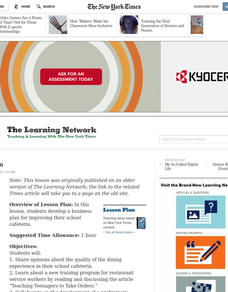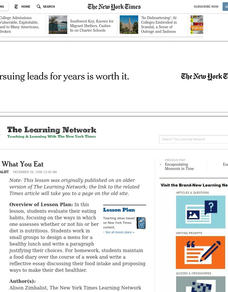Curated OER
Does Security Mean Safer? Exploring Issues of Security in Public Places
Students explore various scenarios that may or may not make them suspicious in the post-September 11 world, and discuss and write position papers about a fatal shooting involving air marshals and a mentally ill passenger.
Curated OER
The Magical Ingredient: FAT
Students examine how the diet industry is contributing to our frustration over unwanted pounds. They identify the part fat plays in their diets and determine if they live in a food toxic environment.
Curated OER
Energy Balance: The Ins and Outs
Students review data from a 24-hour dietary recall to gain a practical understanding of information regarding energy intake and macronutrients.
Curated OER
Asthma
Students experience what it feels like to strain for air in order to empathize with people who have asthma. They create a simple model of the respiratory system to measure the effect of narrowed airway channels.
Curated OER
Deadly Diseases
Students consider the social, political, environmental, economic, medical and other considerations for why particular countries experience outbreaks of certain infectious diseases.
Curated OER
Up in Smoke
Students consider their beliefs about anti-smoking laws before and after examining total smoking bans in various countries and the rationales behind them. They write position papers supporting or opposing the institution of a total...
Curated OER
Redefining Addiction
Students study about how addiction can have both physiological and behavioral effects. They synthesize their knowledge by creating a sensitivity training session for counselors working with teenagers who are addicted to drugs.
Curated OER
Diagnosing Delusions
Young scholars see how widespread medical myths can be potentially dangerous. They synthesize their knowledge by creating pamphlets that help patients learn the facts behind some commonly believed medical myths.
Curated OER
Fit To Play?
Students research certain sports-related injuries and who may be at risk for these conditions. They synthesize their knowledge by collectively developing a comprehensive medical history form.
Curated OER
So Little Time
Students examine the evolution of the AIDS epidemic in various world regions during the last 22 years. They research advancements, programs, and attitudes about AIDS in various world regions They compile a "global timeline" of the AIDS...
Curated OER
Controlling Substances
Students consider their own understanding of household safety, examine the latest remedy deemed poisonous by physicians, and research the hazards of household products. They create public service announcements regarding potential hazards.
Curated OER
TOXIC TECHNOLOGY
Students examine what they already know about computer recycling and cconsider how computer recycling is contributing to a global toxic waste problem by reading and discussing the article, ""Poor Nations are Littered With Old PC's,...
Curated OER
Healthy Relations
Students draw on their own experiences with health care to create educational skits to better doctor-patient relationships. For homework, they create guidelines and write recommendations for an appropriate government role.
Curated OER
Art as Therapy
Students explore how they connect with artwork on an emotional level through writing and the creation of an original piece of art.
Curated OER
Fruit and Vegetable, Vitamins and Minerals
Students discuss and identify vitamins and minerals, their functions in the body, how fruits and vegetables are a good food source, and deficiencies in the body that may occur due to a lack of them.
Curated OER
BUS:Disease Detective - Health Informatics (HST)
Young scholars explore careers in the Health Informatics Pathway.
Curated OER
High-Risk Areas
Students create concept maps exploring causes of drug abuse that, in Siberia and around the world, often lead to the contraction of H.I.V., and develop solutions papers.
Curated OER
Life and Death Situations in Swimming
Students practice dealing with different water emergencies such as: "survival floating," and using a life preserver to pull others to safety.
Curated OER
Sobriety Testing Stations
Students identify each of the different sobriety tests and how they are used to detect the amount of alcohol consumed by a person and the physical affects of drinking alcohol.
Curated OER
Weight Training
Students conduct a class-wide survey collecting, compiling, and analyzing data about fitness, weight loss, and body image issues. They analyze the relationship between exercise and diet in weight control.
Curated OER
You Are What You Eat
Students evaluate their eating habits, focusing on the ways in which one assesses whether or not his or her diet is nutritious. They work in small groups to design a menu for a healthy lunch and write a paragraph justifying their choices.
Curated OER
Partner Mile Run/Heart Rate Calculation
Students improve fitness, calculating target heart rates, and prepare for the mile run physical fitness test.
Curated OER
Straining to Understand Viruses
Learners examine the differences among the strains of deadly viruses and create research-based visual displays about the origins of different strains, transmission, symptoms, treatments and historic impact of specific viruses.



